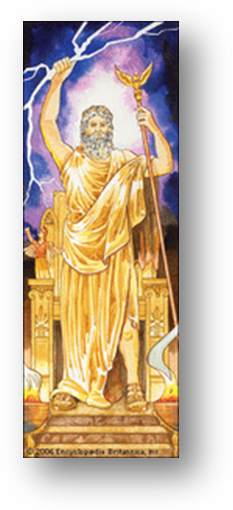THE TITANS AND
CREATION
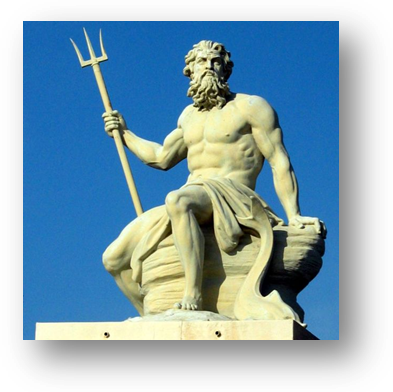
Unit Overview
In
the previous unit we talked about how Greek Mythology isn’t supposed to be
thought of as a religion. We’re going to
talk about that more in detail in this unit.
Throughout this unit, we’ll discuss the Titans, creation, and the
Olympians.
Introduction
First,
it’s important to realize that the Greeks did not believe that the gods created
the universe. Actually, they believed
that the universe created the gods. They
believed that before there were gods, the heaven and earth existed. So, think about heaven and earth as being the
first parents. The Titans were the first
children of heaven and earth, and the gods were the children of Titans.
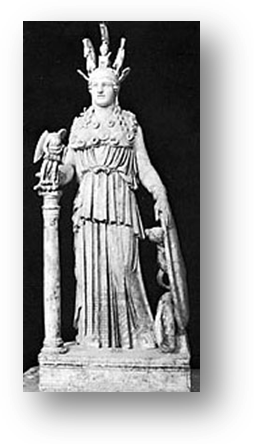
Sometimes,
the Titans are referred to as “The Elder Gods.”
This name is pretty self-explanatory; they were the older gods. The Titans ruled the universe for many years
before they were overthrown by the Greek gods.
They were very large in size and had amazing strength. There were many Titans, but only a few are
mentioned in Greek mythology. We will
now discuss several of the important Titans.
The Titans
Now,
let’s learn a little more background information about the gods and goddesses
of the Titans.
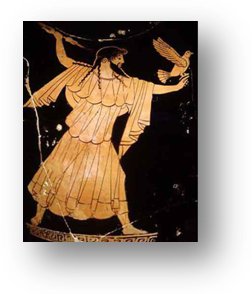
Uranus
was the Sky god. He was the first
ruler. His mother was Gaea.
She created him without help, so Uranus did not have a father. Later, he became the husband of Gaea and they parented many children,
including 12 of the Titans. His rule
over the sky was ended when his son, Cronus,
took his strength and power away from him.
His fate is unknown; he either left Earth or died as a result of this
wound.
Gaea
was the Earth goddess. As we stated, she
was the mother of Uranus. She and Uranus
had 12 Titans, in addition to many other children.
Cronus
became the ruler after he overthrew his father, Uranus. His wife was Rhea.
Their offspring were the first of the Olympians, or the gods who lived on Mt. Olympus. When Rhea
was first having children, Cronus
insisted on eating them. He thought that
if he ate his children, no harm could come to him, knowing what he did to his
own father. Rhea was sad, however, at the obvious murder of her children by
their own father. She decided to trick Cronus by having him swallow a rock
that she had wrapped in a blanket, instead of their son Zeus. When Zeus was older,
he revolted against his father and
the other Titans. Cronus escaped to
Rhea
was the wife of Cronus. As stated, she saved the life of her son, Zeus, by tricking her husband into
swallowing a rock, rather than Zeus.
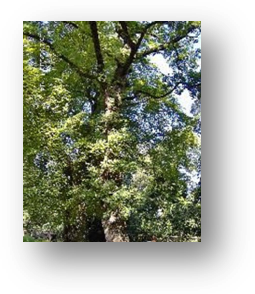
Oceanus
was the water that surrounded the Earth.
Oceanus and Tethys produced
the rivers and streams of the world. They
were also the parents of the water nymphs, who are minor goddesses regarded as
a beautiful young women.
Tethys,
as stated, was the wife of Oceanus. She was the mother of the rivers and streams
of the world, in addition to the water nymphs.
Hyperion
was the Titan of Light. He can be
considered an early sun god. He is the
son of Gaea and Uranus. He married his
sister, Theia. Their children were Helius, the sun; Selene,
the moon; and Eos, the dawn.
Mnemosyne
was the Titan of Memory. She was also the
mother of the Muses, the goddess of
art.
Themis
was the Titan of Justice. She was the
mother of the Fates, and the goddess
of destiny, the Seasons.
Iapetus
was the father of Prometheus, the savior of mankind; Atlas, who held the world on his shoulders; and Epimethus, who opened Pandora’s Box.
Prometheus
was the smartest of the Titans. His name
means “forethought” and he had the ability to tell the future. When Zeus
fought the Titans, Prometheus fought
on Zeus’ side. He and his brother, Epimethus, were given the responsibility from Zeus to create
man. Prometheus is known as the protector of mankind. He is also responsible for giving mankind
many important gifts, such as the gift of fire.
After
reading the information about these gods and goddesses, you will probably want
to do additional research to learn more about them. Feel free to search books or the Internet.
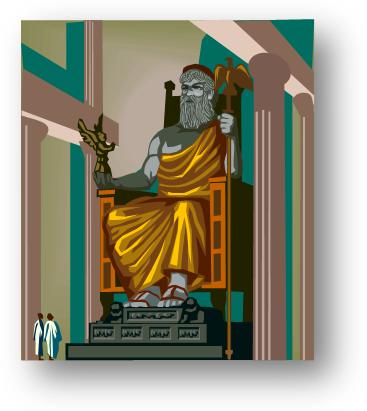
Mt. Olympus

As
mentioned above, Zeus overthrew his father, Cronus, and became the most
powerful god. When Cronus was dethroned,
many of the older gods assumed lower places of importance in mythology. The 12 great Olympians were considered the
most powerful of the gods. They were
called the Olympians because Mt. Olympus was their home. Determining what Mt. Olympus was can often be
tricky. Many believe that it was a
mountain top – the highest mountain top in all of Greece. Some believe, however, that Mt. Olympus was a
mysterious place far above the mountains and the earth. Do not consider Mt. Olympus to be heaven
though. It is just the place where the
gods dwell.
The
entrance to
Before
you read about The Olympians, watch the video segment below. It will introduce you to The Olympians and
their home, Mount Olympus.
The 12 Olympians
The
Twelve Olympians can be described as a large, sometimes dysfunctional family.
The remainder of this unit will concentrate on one Olympian god, Zeus, and his
wife Hera.
Zeus
The
Olympian family starts with Zeus. He is the chief god. The table below explains some details about
Zeus.
|
|
The
Aegis was a breastplate or shield that
was associated Zeus. It was believed
to hold supernatural power. The Aegis
of Zeus was fringed with serpents. |
|
|
One
symbol of Zeus is the eagle. |
|
|
Another
symbol of Zeus is the oak tree. |
|
|
Dodona
Island, the land of oak trees, is the location of the oracle devoted to
Zeus. |
Zeus
has two brothers, Poseidon and Hades.
Poseidon

Poseidon
was Zeus’ brother. He was the ruler of
the sea. His wife was Amphitrite, who was the granddaughter
of the Titans, Oceanus and Tethys.
Poseidon had a home under the sea, but he was also found frequently at
Mt.
|
|
The
sacred animals of Poseidon were horses and bulls. |
Hades
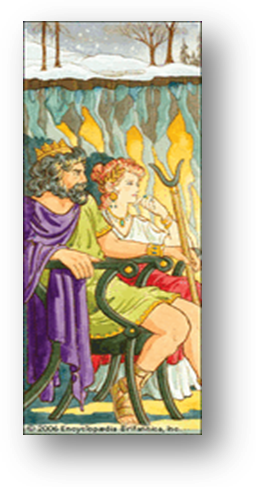
Hades
was the third brother among the Olympians.
His share was the underworld, and he ruled over the dead. He was considered the god of wealth, and it
was believed that he had control of the precious metals hidden in the
earth. He had a helmet that would make
him invisible. He very rarely left the
underworld to visit Earth or
Hera
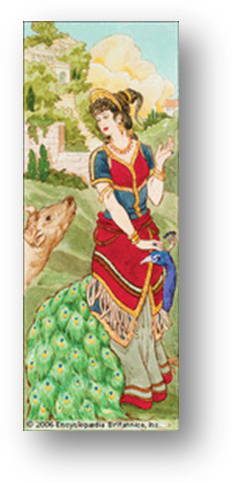
Hera
is Zeus’
wife.
Hera
was Zeus’ wife and sister. The Titans
Ocean and Tethys raised her. She was the
protector of marriage and married women.
Married women were specifically important to her. Hera spent a lot of her time punishing the
women with whom Zeus had affairs. She
was able to hold grudges, and her anger toward women who had affairs with Zeus
also transferred to the children who were the result of the affairs. Hera was respected in every home. She was the goddess that married women turned
to for help.
The chart below gives some important facts about Hera.
|
|
Hera’s
favorite city was Argos, the main sanctuary where she was worshipped. |
|
|
The
sacred animals of Hera are the cow, the symbol of cow-eyed, and the peacock,
the symbol of pride. |
Zeus is
the supreme god and ruler of all the Olympians.
He was the sixth child born to the Titans Cronus and Rhea. Earlier in
this unit, it was discussed that Cronus would swallow his children. Rhea successfully tricked Cronus when Zeus
was born. Instead of giving him the
baby, she gave him a rock that was swaddled in a blanket. Cronus swallowed the rock.
Rhea
then sent Zeus to Gaea, or Mother
Earth. Gaea took Zeus to be raised on
the island of Crete in a cave at a place called Dicte. Cronus did not suspect a thing. On Crete, Adrastea and her sister Ide were in
charge of Zeus. Adrastea and Ide were
ash nymphs. They guarded the cave and
did everything they could to prevent Cronus from learning that he had a
son. One time, they hung Zeus in a
cradle from a tree. This was so Zeus
could not be found on earth, in heaven, or in the sea. They even employed young boys with shields
and spears to circle the tree and make noise if the baby cried.
As
Zeus was growing up, others helped raise him.
The early attendants were called Curetes. Amalthea,
a divine goat, also took good care of Zeus.
Amalthea means “tender,” and that was exactly how she treated young
Zeus. When Amalthea died, Zeus turned
her skin into his Aegis, or
protective shield. This was to honor her
for all of her care and hard work.
When
Zeus grew older, he tricked his way into becoming the cup-bearer for his
father, Cronus. When he was working one
day, he, with the help of his mother Rhea and the Titaness Metis, slipped his
father a drink which made him release the other children. They emerged unharmed because they were gods.
Zeus
knew that if he was going to overthrow his father, he would need help. He freed the Cyclopes from Tartarus, a
terrible place in the Underworld where Cronus had imprisioned them. In return for their freedom, the Cyclopes
gave Zeus his thunderbolts. The Cyclopes
also gave Poseidon, one of Zeus’ brothers, the trident. He used this to shake the earth and sea. They gave another of Zeus’ brothers, Hades, a
helmet. When someone wore the helmet, it
made that person invisible.
Once
they became organized, Zeus and the others attacked Cronus. It was a furious battle. In the end, Hades snuck up behind Cronus
wearing his helmet of invisibility.
Poseidon rendered him immobile with his trident. Zeus struck him senseless with his
thunderbolts. Thus, ended the reign of
Cronus and the Titans. Cronus was sent
to live on a distant island in the Atlantic Ocean.
Zeus
and his two brothers decided that they would draw lots to determine who was in
charge of what aspects of the Universe.
When Zeus became the supreme ruler, he was also the Lord of the Sky, the
Rain-god, and the Cloud-gatherer.
Poseidon became the ruler of the seas.
Hades became the ruler of the Underworld.
Zeus’
power was greater than that of all the other gods together. Zeus was not omnipotent or omniscient. He could be opposed and defied. Zeus is often described as falling in love
with one woman after another. He is
guilty of using all kinds of tricks to hide his affairs from his wife.
Although
Hera is considered the protector/goddess of marriage, she is not thought of as
a great mother. Her children with Zeus
include Ares, Hebe, Eris, and Eileithyia.
She became jealous when Athena was born of Zeus alone. In return, Hera bore Hephaestus alone. Zeus’
children
also included Apollo, Aphrodite, Hermes,
and Artemis.
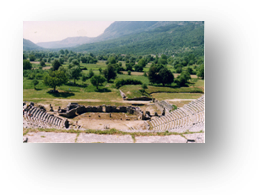
There are many stories of Hera and her jealously toward
other women. One of the famous stories involves Hera and a nymph named
Echo. Hera suspected that Zeus and Echo
were having an affair. When Hera first
approached Echo, she noticed her beauty and her habit of talking a lot. Echo’s discussions with Hera often served the
purpose of distracting Hera from paying close attention to Zeus and his
actions. Once Hera discovered this
deception, she decided to punish Echo.
Hera condemned Echo to never speak an original sentence again. Echo was doomed to only repeat what others
had said around her or said to her.
Another woman who experienced Hera’s jealousy was
Leto. Hera learned that Leto was
pregnant and that Zeus was the father.
Because of this, Hera banned Leto from giving birth on “terra firma,” or
land. Leto was not allowed to give birth
to her baby on the mainland or on any island at sea. In addition, Hera kidnapped her daughter, Eileithyia,
who was the goddess of childbirth. This
was to prevent Eileithyia from helping Leto give birth. Leto found
After
reading the information in this unit, it is very obvious that Greek Mythology
is very interesting, but intertwined. Also,
as we learned that even though the Titans were known as the Elder Gods, the
Olympians ruled after the Titans were removed from power.
Writing About Literature
This
unit focused on the identifying the major Titans and Olympians. Now you will be using the writing process
that you learned about in the last unit.
Choose three characteristics of Zeus and Hera that you admire. In a five paragraph essay, identify those
characteristics and explain why you admire those characteristics.
Start by completing one of the information gathering tasks from the chart
below.
|
Gathering Information Tasks |
|
|
Brainstorming |
A
technique in which you come up with as many ideas as possible on a subject |
|
Clustering |
A
technique in which you break down a subject into smaller parts – Place the
subject in the middle and circle it.
Write related ideas around the subject, circling them and drawing
lines to the subject. |
|
Asking Questions |
A
technique in which these questions are used to gather information: Who?
What? When? Where?
Why? How? |
|
Direct Observation |
A technique in which the writer relies
on the five senses – sight, touch, smell, hearing, tasting. |
|
Indirect Observation |
A
technique in which the writer examines the experiences of others by asking
questions, watching, interviewing, etc. |
|
Imaging |
A
technique in which the writer uses his imagination to generate ideas |
Then
create a thesis statement and write your rough draft. Once your rough draft is complete, think
about the requirements for the writing.
Use the rubric below to self-evaluate your work. Strive for
work that would earn a score of four.
|
4 |
3 |
2 |
1 |
0 |
|
·
Writing explains the topic logically
and completely ·
Ideas, details, and examples support the topic ·
Appropriate vocabulary is used ·
Variety
of sentence structures present ·
Correct
punctuation, capitalization, spelling used |
·
Writing
discusses the topic ·
Consistent
logic and completeness missing ·
Adequate
and appropriate vocabulary ·
Errors
in sentence structure/ agreement may be present ·
Punctuation,
capitalization, spelling errors may be present |
·
Writing
discusses topic ·
Unrelated,
unnecessary information included ·
Paper
lacks completeness ·
Word
choice is acceptable but often monotonous ·
Grammar
errors evident ·
Punctuation
and spelling errors may be present |
·
Writing
hints at the topic ·
Scarce
supporting details, ideas, and examples ·
Inappropriate
vocabulary ·
Grammar,
capitalization, punctuation, and spelling errors are present. |
·
Writing indicates
total disregard of the topic |
Next, revise your writing. Use the checklist
below to revise your work. Your teacher
will be looking for these items when grading your final writing.
|
Research Paper Revision Questions |
||
|
YES |
NO |
|
|
|
|
Is the introduction
interesting? |
|
|
|
Does the introduction
explain what the paper is about? |
|
|
|
Did you avoid using
words like I and me in your introduction? |
|
|
|
Did you stick to your
topic? |
|
|
|
Is the body of your
paper organized in a logical order? |
|
|
|
Did you correct run on
and fragment sentences? |
|
|
|
Are all the ideas
clearly explained? |
|
|
|
Have you limited each
paragraph to just one main idea? |
|
|
|
Did you write many
different kinds of sentences? |
|
|
|
Did you use
descriptive words throughout your paper? |
|
|
|
Have you combined short,
choppy sentences into longer, more mature-sounding sentences? |
|
|
|
Does the conclusion
summarize the important information from my paper? |
|
|
|
Have you taken out
information that you don’t need? |
Finally,
proofread your writing. Check for
spelling and grammar errors as well as run-on sentences and fragments. Make any final changes, and then submit your paper
to your teacher.
